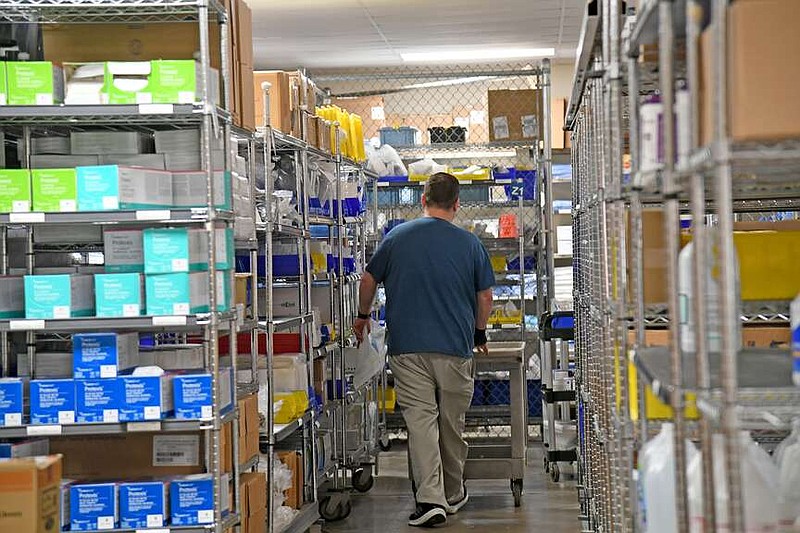National Park Medical Center has already started stockpiling necessary items for the April 8 total solar eclipse in anticipation of a larger number of patients due to an expected influx of visitors to Garland County.
Hospitals are required to keep three days of supplies for normal operation, but hospital administrators said they have increased that to a seven-day supply due to the celestial event.
"We wanted to at least have seven days' worth of supplies, so we won't have to worry about a truck coming or going," Scott Bailey, the hospital's CEO, said Tuesday.
"We were literally walking out this morning, and our Pepsi guy already said, 'Hey, we're closed that week. Sorry. We're probably not going to be driving through your area past Thursday.' So we knew that was all coming," he said.
Video not playing? Click here https://www.youtube.com/embed/tVMBQ95_1Tg
The hospital has been in contact with hospitals in Casper, Wyoming, to gauge their plans against what that city faced in 2017, Bailey said.
"We reached out to our buddies out in Wyoming that had this happen in 2017 and said, 'What did you see?'" he said.
"They said, 'Oh, yeah, we planned for 100,000, and half a million showed up.' The hospitals weren't that inundated with inpatients, but what happened was a lot of bumps, bruises, things you're going to expect.
"People are having a good time, maybe getting themselves in a little bit of trouble, but the influx of inpatients wasn't a big deal. Outpatients, you had a nice big growth there," he said.
Lisa Wallace, the hospital's chief nursing officer, said the hospital has already gotten additional linens and is starting to stockpile medical supplies.
"We have a fairly well-stocked materials warehouse already," she said. "It would be sort of the aftermath -- what we might go through during the event and then what we would need to get in touch with right after. Assuming the traffic clears right out, we get very regular deliveries -- two to three days a week -- of supplies already. So we feel like that might be adequate."
Casey Willis, the chief operating officer for the hospital, said staff will be able to stay at the hospital, and additional food will be needed to help provide for them.
"We have a cold food truck that's going to be delivered here the day before the event," Willis said. "We'll have some additional food here. Our coolers will only house a couple of -- like Lisa said -- three days' worth of food, and so we're anticipating having those trucks here for several days so that we can order more food. We're planning on having staff that stay here, so we're going to have to feed more people, and we have to make sure that we do that.
"So food is ready. Like she said, linen is ready. Water is ready. We've bulked up on all of the necessary things that we need to in order to take care of a potential influx of patients and the staff that will be housed here, especially on that Monday but possibly over the weekend if some of them want to stay that weekend."
One big concern for the hospital has been communication. A massive increase in the number of people could overwhelm the cellular networks, which would affect communication inside the hospital.
"If the cell towers go down, that makes a big influence on this community," Bailey said. "It makes a big influence on us internally, so we've planned for that with some internal radios."
Wallace said there are many types of communication used throughout the hospital, and the hospital has contingencies to deal with many issues that could arise.
"We have communication that runs off apps," she said. "We have communication that runs off of our own internal internet, and then we have outside communication. Most of the communication we've heard from the city and county indicate landlines might not be as much an issue. Of course, we can still communicate internally with landlords, so it's just kind of an unknown, I suppose, knowing exactly how much will go down and when."
Willis said "100 small radios" have been purchased to allow for internal communication among departments.
"The range is limited, typically to within the department, but we use our cellphones a lot," she said. "You need to get in touch with somebody, the first thing you do is pick up your phone and try to call them or text them."
She said they have 16 channels which are assigned "so if I walk from one department into another one, I can get onto their channel and pick up on their frequency. So we've tested them, and we're actually using them right now."
Due to the anticipated traffic congestion around the eclipse, Bailey said those in the northern part of the county can visit NPMC HealthCenter in Hot Springs Village instead of trying to come to the hospital on April 8.
"We're trying to be very, very proactive with the city and get it out there on the web pages and everything so people understand all those other clinics that are available," he said.
"If you're in Hot Springs Village, go to our Hot Springs Village clinic. If you're on your way in from Jessieville, stop by the Hot Springs Village (clinic). HealthStar has given us their group. CHI (St. Vincent) has theirs. There should be enough, and to Casey's very strong point, we opened those clinics purposefully. So people could have access to health care that we're not tied up in the OR or other parts of the hospital."
